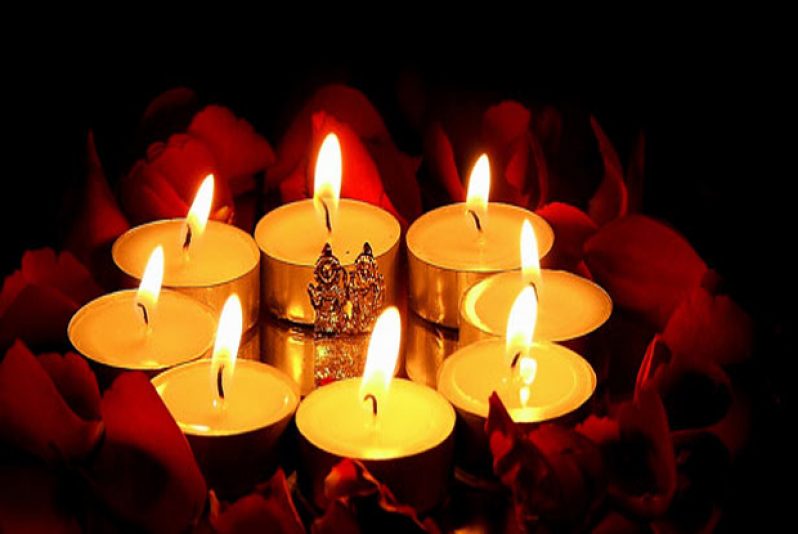Written By Ramdai Janet John-Dorie
THIS time is known in the Hindu religion as the Iron, or Dark, Age. As with many other religions, the Hindus celebrate many festivals, and among them is DIWALI, or DEEPAVALI, called the festival of lights, and originating in India. Hindus all over the world celebrate DIWALI about the second week in November each year. As this time approaches, there is a grand preparation by young, old, rich, poor, weak and strong. Buildings, trees, animals, mannequins and statues are all adorned with colourful lights and costumes. This festive mood fills the air with great excitement, joy and happiness.
As is customary, a story is told behind each festival. In this case, it is said that Lord Rama was returning this night from bring exiled in the jungles for 14 years; and since this night is believed to be the darkest night (according to the Indian calendar), people illuminated the streets and buildings with attractive lights and flowers to welcome their Lord.
The believers also feel that, on this special night, they should light earthen lamps and place them at holy places, like temples and altars of wherever they worship God; and by doing so, their dead relatives would be saved from further suffering, and be able to see their path to Heaven.
Our celebrations must be done with wisdom and understanding, and there must be some measure of happiness in celebrating. It is good to reflect on these numerous myths behind religious festivals, as most times we tend to celebrate without understanding the moral behind the stories.
Take the Bible, for instance. There are endless stories, proverbs, and psalms, but how many of us do understand, imbibe, and become embodied of their true essence?
For me, every day should be DIWALI, because what is the use of celebrating with great splendour and galore on that day, and still live in the doldrums for the rest of the year?
Hindus observe certain rituals on this day of DIWALI, and each ritual carries a spiritual significance. They start cleaning the house, which signifies purifying the body through meditation. Wearing new clothes represents attiring the inner self with newness, i.e. desisting from the five dangers in this life, namely lust, anger, greed, attachment and ego; and start creating and entertaining clean thoughts, words, actions and relationships and atmosphere.
Illuminating the house with colourful lights means that the mind should be decorated with spiritual accessories such as peace, love, tolerance, generosity, kindness, mercy etc.
During such time, members of the business community close their books of old accounts and start new ones. This denotes the doing away with bad habits, and cultivating new ones.
Exchanging cards and gifts means the sharing of the most elevated teachings (Godly knowledge), and having good wishes and pure feelings for all, as in loving thy neighbour as thyself.
We should not see the weaknesses of our brothers and sisters, but their specialties; and see no evil, speak no evil, hear no evil, and do no evil. I should recognize the strengths of my brothers and sisters, and try to emulate their good qualities, and do away with my weaknesses.
When I think of others, I waste energy and create TENSION, and so there will be no attention on the self.
Distribution of sweets signifies that my words should be soft, sweet and flavourful. Praying and performing POOJA (rituals of burning incense, sprinkling holy water, and using up sweet, fragrant flowers) signifies “I am in readiness to offer all my weaknesses, burning them through the fire of Yoga.
“With these thoughts of God, I am yours with my mind, body and wealth. I surrender to you, my only support. I will live and die in your love.” This will help to cleanse the body as well as the soul, and help me to become detached from things in life.
The people fast on this day also, i.e. they abstain from eating meat, drinking alcohol, smoking, or even having body contact. They eat sweet foods and light drinks. Fasting here signifies that I should abstain from telling lies, having revengeful feelings, or, for that matter, committing any abominable act. I must be aware that I will have to face the “Axe” for what actions I perform.
The earthly lamps, called DIYAS, represent the body, which is a combination of five elements of fire, water, air, space and earth. It is perishable, and is only lent to us for a period of time – ash to ash, dust to dust.
The flame of the diya represents the soul connected with the supreme soul, God; constantly it will give bright and sparkling rays.
The oil represents the priceless ingredient of spiritual knowledge. To keep the flame alight means to be always conscious. “I am light, being connected always with the Supreme Light.”
With the awareness of when I change the world can change, in bringing about the new world—paradise, it takes physical power to change the strength of the body. This means I must be focused on the source of strength – God, the powerhouse — as food, exercise and vacation etc are just helpers to the physical body; but food for the soul, like good thoughts, are just as important.




.jpg)








